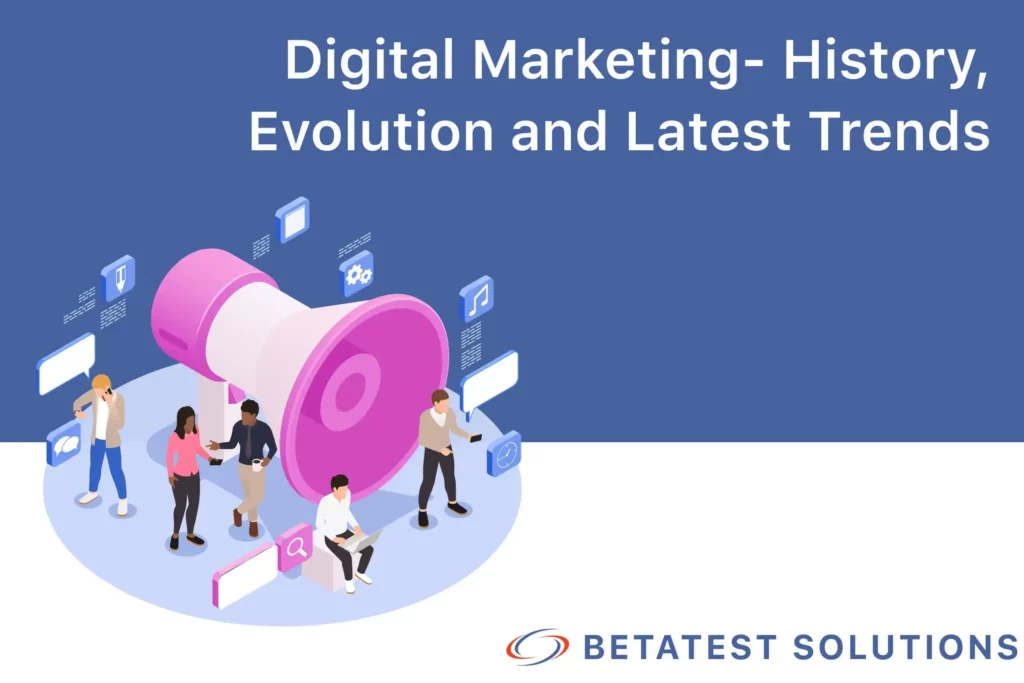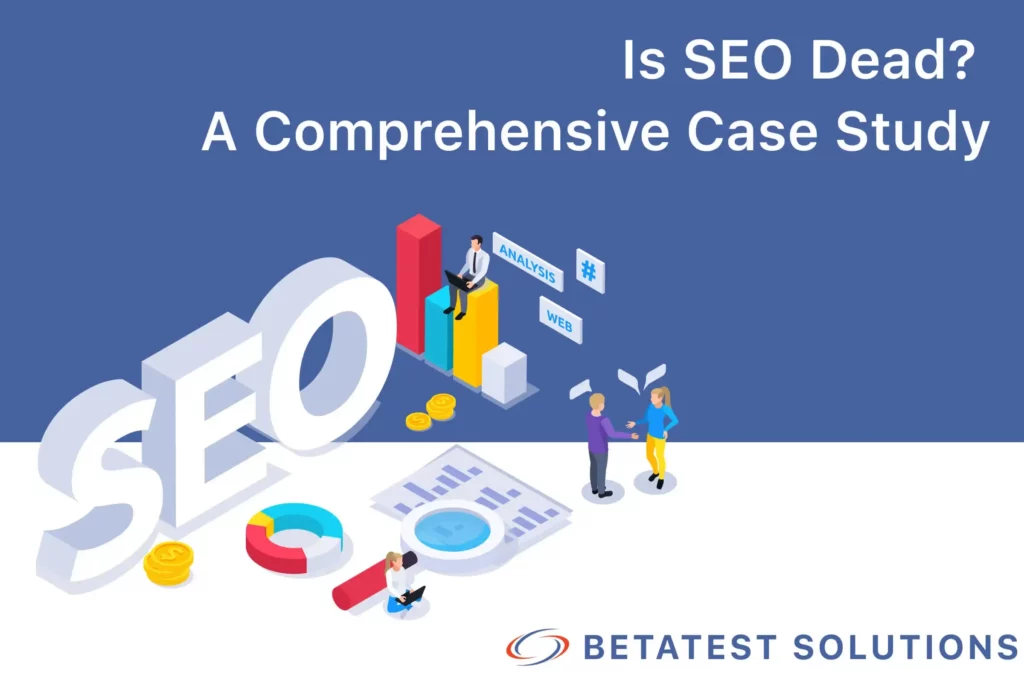Introduction
Living in a world where social media is the sole platform covering every aspect of the happenings in the world. With over 170 million users worldwide, people use social media as a part of their daily routine. Every working professional or non-working is expected to be familiar with the ongoing trends in the social media world. But are you aware of how these social media posts or videos go viral? How do these things bring organic reach to the company? It’s digital marketing techniques that promote the products over the internet. Digital Marketing is the way of using digital channels to market products and services to targeted consumers around the globe.
The content we see or the organizations we hear daily is a part of digital marketing strategies. Very soon, traditional marketing platforms will become outdated because of digitalization. So, let’s learn about digital marketing history, evolution, and trends in depth.
What Is Digital Marketing?
Digital Marketing is commonly known as Online Marketing. In simple words, Digital marketing refers to the marketing of products and services over social media platforms. It comprises many techniques to attract the targeted audiences to the businesses.
Many companies use different channels like Facebook, Pinterest, Instagram, or Linkedin to promote their business through email marketing, banners, pay-per-click (PPC), and more. It helps the businesses to hit their target which helps in generating the required revenue with few hassles.
Consumers are highly demanding and impatient these days. They only want services to be delivered within minutes without any much investment. This brings digital marketing into work. The consumption of digital content is increasing. Every second, a new user registers themselves on various social media platforms which brings the audience to target. A big thanks to the availability of affordable gadgets and the proliferation of the internet to make this happen for real.
The Birth Of Digital Marketing: The Timeline
Digital Marketing already has its roots in the early days of the Internet. The 1990s year marked with basic websites and email marketing to promote businesses or companies worldwide. Many brands had already started to explore the market and were expanding their business to the world. For that, they were exploring the potential of reaching a global audience through online mediums. Yet, the efforts were lower in those days due to the lack of sophisticated tools.
Evolution of Digital Marketing- The Timeline
The evolution of digital marketing is skyrocketing. The dynamic journey has seen significant technological advancements, consumer behavior, and strategies. Here is the timeline showcasing the milestones and developments in digital marketing.
-
Pre Internet Era (Before 1990s)
During this time, the marketing efforts were limited to offline while focusing on traditional ways like radio, TV, and more. The experiments with computerized marketing were only limited to databases and electronic tools.
-
1990s- Emergence of the Internet
In the year 1991, the World Wide Web was introduced to the world by Tim Berners Lee. It opened the internet for public access through search engines like Yahoo and AltaVista to ease the indexing of web content. By the late 1990s, the dot com boom increased investments in online business giving birth to internet advertising through ads.
-
The early 2000s- Growth of Search Engines and Google
During the early 2000s, google AdWords introduced pay-per-click (PPC) advertising and Search Engine Optimisation (SEO) came into existence to improve the website rankings.
-
Mid 2000s- Social Media Era
Several social media platforms like Space, Linkedin, and Facebook gained popularity. By the late 2000s, Twitter, YouTube, and other platforms came into existence by offering a new avenue for marketing and engagement purposes.
-
Late 2000s- Mobile Revolution
In this era, the proliferation of smartphones led to the rise of mobile marketing by focusing on responsive websites and app advertisements.
-
2010s- Content Marketing and Personalization
By 2010, content marketing stands in a good position and has already gained significance in creating valuable content for audiences.
-
Recent Trends (2020s-Present)
The advancement in analytics and AI-powered tools enable better insights along with personalized marketing strategies to enhance the online presence. It includes video marketing, influencer collaboration, Voice Search Optimization, and AI tools such as Chatbots, and more.
Throughout the timeline of the growth of digital marketing. It has evolved in adapting technical innovations as per market trends which leads to enhanced engagement with audiences.
5 Ds of Digital Marketing
The 5Ds of Digital Marketing represent five key aspects of the process, these are:
- Digital Devices: These are mobile phones and computers that people use almost every day to market to a specific audience.
- Digital Content Platforms: These are the platforms where users interact. These platforms can be a good option for advertising purposes.
- Digital Media: Paid or owned digital media channels are used to increase engagements. It includes activities like online advertising and social media marketing.
- Digital Data: It is all about the target audience to achieve the marketing goals. A user generally collects the data about the target audience through surveys and other means.
- Digital Technology: It is all about using the right technology to achieve marketing objectives. The introduction of Artificial Intelligence and AR/VR helps in bringing the organic audience without hassle.
Types of Digital Marketing
Following are some of the different types of digital marketing one can try:
- Content Promotion: Content promotion is a type of digital marketing where the major focus is on the creation and distribution of the content to the right audience only.
- Search Engine Optimization (SEO): Search engine optimization (SEO) is a popular technique for obtaining high-quality website traffic.
- Search Engine Marketing (SEM): It refers to obtaining paid and free search.
- Social Media Marketing (SMM): In simple words, it is the process of attracting traffic through various social media platforms.
- Affiliate Promotion: Nowadays, affiliate promotion has taken a new level and has become a popular way to generate income online these days.
- Email Marketing: It uses email to promote one’s products and services to the world.
- Instant Message Marketing: It is a dynamic and effective digital marketing strategy to leverage messaging platforms with customers in real-time. It involves businesses using platforms like Facebook Messenger, Chatbots, and WhatsApp. It analyses the widespread use of apps by enabling users to foster digital connections.
Benefits of Digital Marketing
Digital Marketing offers a plethora of benefits for businesses to expand their reach and engagement with customers. Some of the key advantages include:
- Global Reach: It allows businesses to hit global audiences. The internet’s widespread accessibility allows many companies to connect with potential customers by breaking geographical barriers.
- Cost-Effectiveness: If we compare it with traditional marketing methods such as TV or print ads, digital marketing offers a better return on investment.
- Target Advertising: It allows specific targeting based on behaviors, demographics, interests, and many factors and criteria as recorded through the users. It ensures that marketing efforts increase the likelihood of conversions.
- Enhanced Engagement: Digital Marketing offers greater interaction and engagement with the audience. Many online platforms encourage two-way communication between brands and customers to leverage strong relationships.
- Measurable Results: One of the significant advantages is the ability to analyze the insights and growth of the business in real-time. Metrics like website traffic, pay-per-click (PPC), and other ways to provide valuable data to business owners.
These benefits highlight the potential of digital marketing for businesses looking for growth of their brand and increased sales. It fosters lasting relationships in the long run.
The Scope of Digital Marketing In 2024
The growth in digital marketing is immense. The trends evolve each year as many companies register themselves along with the introduction of new technologies. If we look ahead to 2024, here are some trends that will contribute this year to more successful results.
- Analytics: Analytics will give valuable insights that help in optimizing business strategies. The marketers will publish content pieces and then check how effective it is. By conducting real-time analysis, marketers individualize content strategies to respond as per the performance.
- Social Media Influencers: Advertisers in different sectors connect with social media influencers to promote their brand’s visibility. This proves to be an effective way in digital marketing strategies because consumers tend to trust others who are using it. Few celebrities often promote products that increase both sales and brand value.
- Artificial Intelligence: The advancement in technology has already increased to a great extent. AI enables digital markets to analyze user data to further customize their business strategies. AI helps companies to understand how their product is hitting the market. Moreover, it also provides customized help at each stage. Programmatic advertising is a strategy used to account for more than 72 percent of the year 2021.
- Video Game Changer: The promotion or marketing through video will always remain on top. Digital marketing capitalizes on users’ short attention spans instead of reading long paragraphs. Also, many social media channels support video hosting and sharing. Moreover, adding SEO techniques like including keywords makes it easier to attract potential customers.
Conclusion
The digital marketing industry has shown some drastic changes since its humble beginning. It is a dynamic method that allows professionals to keep up with the trends in the market. Now, we have understood every aspect of digital marketing and how it works to optimize the business for growth. It can’t be afforded if the individual is not putting right efforts for growth.
FAQs
Digital Marketing is evolving as a promising industry. It is growing at a tremendous rate of 25-30% every year. The leading factors contributing to the growth are social media channels, online portals, and high-speed digitization.
It was in the early 2000s when SEO entered into Indian market when marketing was only done through newspapers, magazines, or television.
AI automates several tasks like lead generation, lead scoring, and customer retention. By introducing AI, Marketers can collect potential customers and increase their business revenues.



